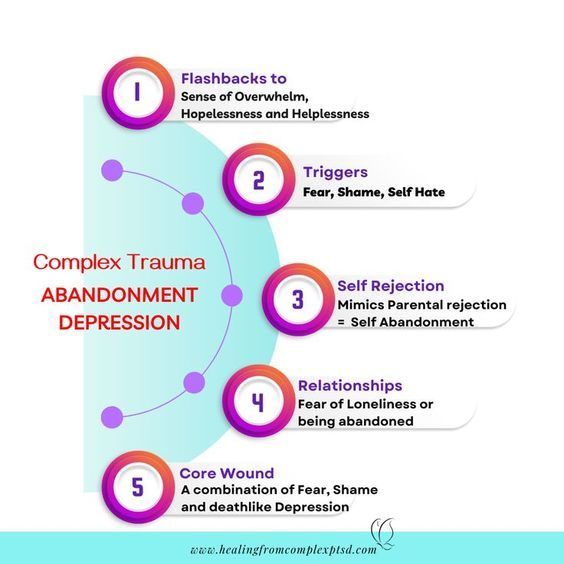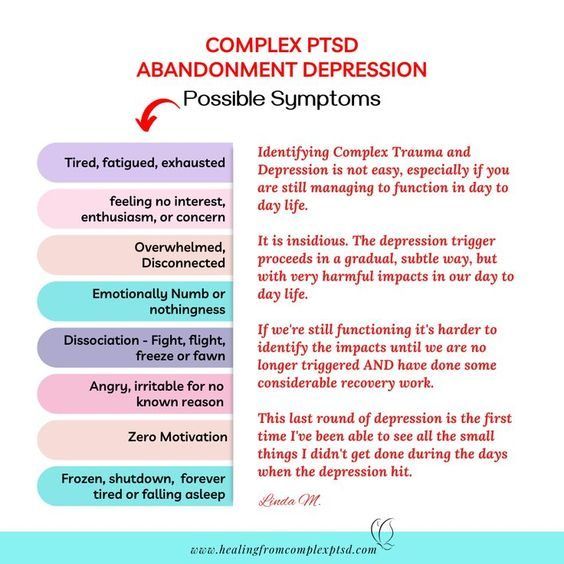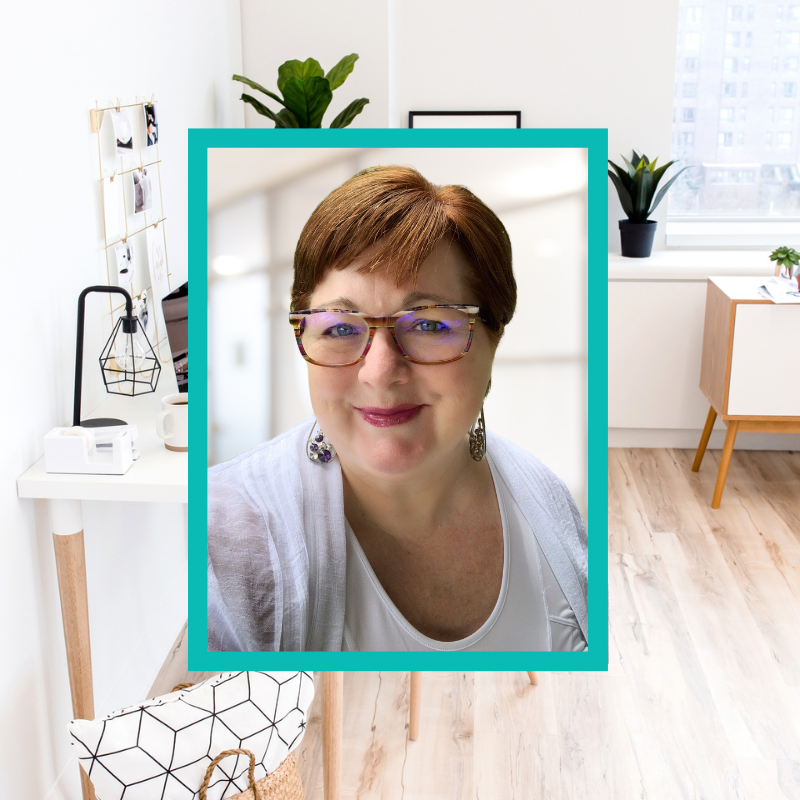8 Signs of Abandonment Depression
This article was posted on our original blog at Healing from Complex ptsd, March 18th 2023.


Abandonment Depression Video Transcription
Now for those that you who've been part of our Global family since I've been doing videos, you know that I've been trying to find out answers, like real answers to the depression that comes on because it's so Insidious. Have you ever pictured or ever seen fog coming in over the ocean and creeps in over the land and it’s just this really slow process and it happens. Next thing you know you look up and everything's covered in fog. That's what this abandonment depression can be like. You can find more videos that I’ve made on depression under the playlists of depression and there's lots of information about my journey through and the things that I've discovered along the way.
I never believed that I have depression in the normal sense of what’s regarded as depression. I'm not somebody who's walked around going, oh I'm depressed and I really feel it in my body. For me in the beginning the depression just used to knock me out. I'd be getting ready to go and exercise and I'd wake up with one gym shoe and suck on and go, what happened? There's videos of all the things that I've done along the way to get to where I am today.
I came out with a list of possible symptoms for abandonment depression. Now abandonment depression is different to depression in that we will have experienced some form of Abandonment in our primary caregivers be they parents or adopted parents or foster care Etc. Whoever our primary caregivers were, for some reason we experienced abandonment. In my known memory I experienced abandonment when overnight. My family was my mother, my father and my brother. Overnight they all disappeared and I was four. I was left at my grandparents which of course everybody thinks, oh she'll be fine and of course my needs were taken care of.
But when your whole family disappears overnight and you don't know where they are and for three weeks you’re looking for your mother and you’re not allowed to talk about it. You know we don't talk about that and it's just a look. It's non-verbal from your Grandmother whom I loved very much. It's like, wow okay. It has an impact on us and plus I have a significant intergenerational abandonment trauma which I've talked about before as well.
These are possible symptoms that you might recognise but not recognise as abandonment depression. There's tiredness, fatigue and exhaustion and you don't know why. There's no known reason why you would be feeling this way. Oftentimes you may just fall asleep and not even be aware that it's happening. A feeling of no interest or no enthusiasm or concern for life around you. May feel overwhelmed and disconnected. It's like not having a reason to get up and do what you love doing. Then there's the emotionally numb or nothingness and it's like a void inside of you and you can't understand why it’s there. There's dissociation, you might experience fight, flight, freeze or fawn response. Angry and/or irritable for no known reason. You might find yourself just going off like a frog in a sock and just like why what happened.
Zero motivation so you can't summon motivation out of thin air at all no matter how hard you try and you do try. You may feel frozen, shut down or forever tired or falling asleep. In a way that is again it just doesn't make sense like why is this happening? Because you're functioning as an adult and you're like this doesn't make sense. I think I share with you in one of the videos I walked into my doctor and he said, you've got major depressive disorder and I'm like, I'm not depressed. I’ve got anxiety issues but I'm not depressed. He said, oh well you know if there’s anxiety there’s depression. Anyhow turns out he was right. It just hadn't been linked into the complex trauma and abandonment depression.
This round of Abandonment Depression was different again. We moved house and I was so over the moon happy like absolutely happy. All through the move I maintained a calm disposition. No matter what happened I was able to just keep calm and keep making the next right decision that I had to do. But then there was these overwhelming feelings of everything is going to be ripped out and away from me. They became so heavy and so dominant that I had to sit down and do some self-reflection as why am I feeling this way? it doesn't make sense. I often find myself saying that a lot when it comes to abandonment depression is what is happening doesn’t make sense. It's not part of my life here, now.
Then when I do the self-reflection and just felt into what was happening and let the images come up as to what was happening. I realised that one of the links to my abandonment issue/challenge was that after my mum came back after the three weeks was I have this really vivid memory of being in a moving truck with my grandfather and my brother. We had those little swim kickboards now blowing off the side and my grandpa whom I loved is just like, it'll be alright we will get there don’t worry about it. Again nothing's been said but there's a whole sensation of my whole world's being ripped apart.
When I could see the image of it, oh well it makes sense now why I'm feeling like everything's going to be ripped apart because here I am I'm driving the removalist truck. I had been driving the removalist truck. I was able to settle then But then along came a video from Gabor Maté who talks about how when we have anger in childhood and we're not allowed to express it and so it becomes habitual that we automatically and unconsciously push it down. I sat there and he said, imagine how much effort or how much energy it takes to push that down. It just blew my mind. I was like, oh my goodness that's where the anger is. It's from all those years ago when I couldn't be angry and I had to hide it and I had to make it a different part of me.
Then what happened was I was able to bring awareness to when I began to sense anger inside of me. As the anger energy moved through my body it was like observing it and just letting it go. I didn't have to buy into it. So that's one side of it. Then the other side of it was being willing to admit when I felt angry with the current situation and say, okay I need to be able to express that I’m angry and I don't have a solution. This is what I see happening around me and I want to work towards a solution.
Ironically I happen to get in the car with my youngest son who's 24 now. I was saying to him what was happening with the anger and everything. I said, I'm not angry as in me but the not having any control over what's happening and not knowing what to do is making me feel really unsettled. So that was another side of it that’s learning to talk about what's happening with the anger and acknowledging that it comes from things feeling out of control. That's something that you can look at in your everyday life as well.
One of the things I was doing too was listening to Janina Fisher in one of my certification programs. She talks about how we as children had to hide that anger, that fear and it became a part of us that formed as the depression. When I started to think about depression being a part of the trauma, not a part of me, it began to give me insight into ‘that's just one part’. Then I began to be able to say, okay what maladaptive behaviours did I form throughout all my formative years to hide the depression, to hide the anger? How can I begin to acknowledge that they're there and not blame myself?
Another thing I began to do was wrap my mind around the fact that these are parts of me, they are not the whole of me. If I can sit and just be with that part and understand what my needs are today as an adult and address those needs then all the energy goes out of that part of the depression. One of the highlights of all of this, going through all of these processes has been the relief that not only can I address my needs or find out what they are such as what's driving the depression or what's driving the anger.
Also with the depression it was like if I had to shut down and hide as a child then I can begin to recognise that behaviour in my adult life. It's like where am I shutting down and hiding? Then the opposite side of that was where am I not taking enough time for myself to re-energise myself? In another way of putting it, to refill my love back, where am I not doing that for myself and repeating childhood behaviours of putting other people first? so these are some serious questions we can ask ourselves. As we begin to identify what those things are, it makes it easier to become motivated to not walk down those paths again.
As I was doing all of this, I actually got myself a new treadmill at home. So I don't go to gym, I do all my exercise at home now. I was on the treadmill and I realised my body lower body was aching and I went hmm I haven't felt my lower body in a long time, certainly not ache. That's when I realised that as it’s aching it's all the tight parts that have been held tightly for a long time. Now if I can just keep walking and relaxing. walking and relaxing, letting the oxygen in through my body right down through to my feet then it's going to become more well.
One critical thing that happens when we go to be with a trainer is their push and push and push and push because they believe they're doing the right thing and that's okay. But for us with complex trauma we've got to learn to slow it down and let our breath in. Because it helps us loosen up our whole internal self. Sure enough that night when I was lying in bed I could feel everything starting to get tight again. I went, I'm just going to stretch my legs out bit by bit and I could do it. Then I went. now I know I need to get back on the treadmill and it's only for 10 minutes but just keep pushing that barrier. Letting my muscles relax, letting them feel the pain of movement and going, I'm safe, I can move. Doing it all gradually so that I'm not overloading the brain and the brain doesn't go oh shut down. This is why our recovery has to be a very very gentle gentle process.
I know there's a lot of questions in there and I hope that through the bits and pieces you're able to take away and think about and reflect what's happening with your abandonment depression. Also that it gives you some insights into how we can begin to recognise what it's driving so that we can bring it into our conscious adult self. As I've done this whole entire process I'm now aware when my brain begins to shift into that depression shutdown mode. I'm still working with that. When I have more information about how to manage the brain part of it I'll let you know as well.
Thanks for tuning in, thanks for listening. I've got some videos that I want to share with you along the way to especially about the non-helping professionals that my clients have been seeing because I want you to know that these things that I share with you about the professionals who are not helping my clients because you need to know that they’re abnormal as well. When we know that, we don't sit in therapy chairs for decades and getting nowhere. Remember the thriver membership now has over 30 homework books that I've put together for you and a whole bunch of courses that you can use either with yourself or with your professional and help you on this Recovery Road a lot quicker than normal.
Much love and thanks to you all and I'll see you in the next video.
Bye for now.
Courses
Let's Create Generational Change Together
To support this goal, Healing from Complex PTSD allows you to:
- Access professional education and business support from industry leaders
- Learn a results-driven approach to CPtsd recovery
- Discover a full library of ready-to-use tools and resources
Developmental Trauma Self-Check
Over the past 12 months, how many and how often have you noticed:
-
I work hard to hold it together in public, then crash in private.
-
I struggle to name what I feel until it overloads me.
-
I say yes to keep the peace, then feel resentful or empty.
-
I feel loyal to people who do not treat me well.
-
I lose time or feel foggy when stressed.
-
I avoid closeness or over-attach quickly, then panic.
-
I find it hard to trust my own judgement.
-
I feel shame when I try to set boundaries.
-
I need external approval to feel steady.
-
I push through fatigue instead of pausing.
How to use this:
0–3 items often: you may be using a few survival patterns.
4–7 items often: consider paced support to rebuild safety and choice.
8–10 items often: a trauma-trained professional can help you restore stability and connection.
Brain Impact Self-Check
Over the past 12 months, how often have you noticed:
-
My mind jumps to what could go wrong, even in safe moments.
-
I find it hard to remember recent details when I am stressed.
-
Decisions feel risky, so I delay or avoid them.
-
I forget good experiences quickly and dwell on the bad.
-
I feel numb or overwhelmed, with little in-between.
-
I lose words when emotions rise.
-
I misread neutral faces or tones as negative.
-
I struggle to notice body signals like hunger, tension or breath.
-
I do better when someone I trust is nearby.
-
I feel different “versions” of me in different settings.
How to use this:
0–3 often: some protective habits; gentle self-care may help.
4–7 often: consider trauma-trained coaching to build daily brain skills.
8–10 often: a paced, brain-based plan can restore clarity, memory and confidence.
For formal assessment, use recognised measures:
-
ACE-IQ or ACE-10 for adversity history (education only on public pages).
-
ITQ (International Trauma Questionnaire) for ICD-11 PTSD/Complex PTSD.
-
DERS for emotion regulation, DES-II for dissociation, PCL-5 for PTSD symptoms.
-
PHQ-9, GAD-7 for mood and anxiety; OSSS-3 for social support.

